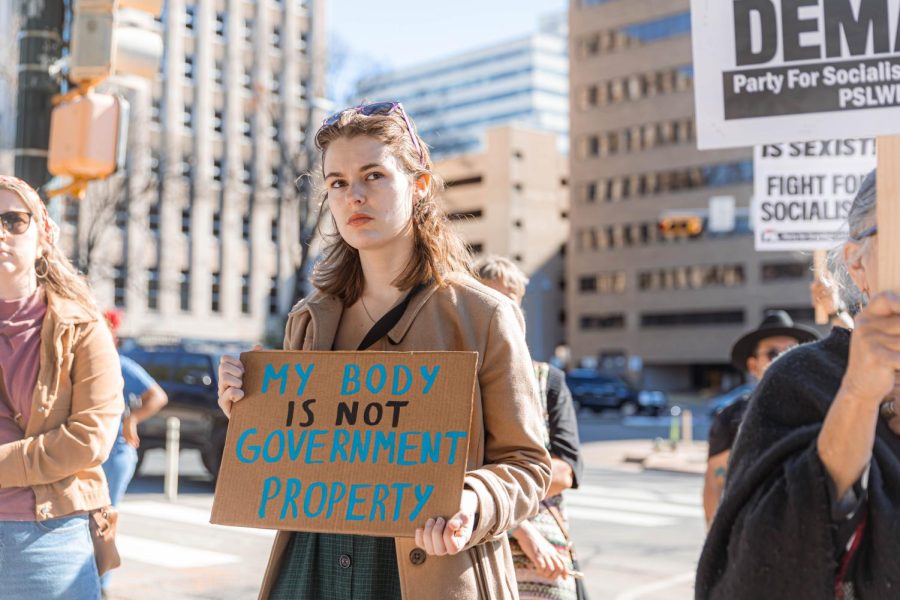50 years later, UT students, protesters commemorate, fight against the loss of Roe v. Wade
On Jan. 22, 2023, Madly Kilburn protests the overturn of Roe v. Wade outside of the Texas State Capitol.
January 23, 2023
Chants of “the people, united, will never be defeated!” echoed down Congress Avenue as almost 100 Austinites and UT students gathered at the Texas Capitol to protest state legislation restricting bodily autonomy on Roe v. Wade’s 50th anniversary.
“We’re pissed off that our U.S. government system does not reflect the will of the vast majority of people that want to codify abortion rights and protect them in federal law,” said Winn Ellinger, a Party for Socialism and Liberation protest co-organizer. “The Supreme Court has shown that without pressure from a movement of the masses, it is an enemy of democracy and an enemy of people’s rights.”
PSL assisted in organizing the Austin protest, one portion of a national movement that also occurred in other Texas cities like Dallas, Houston, San Antonio and Waco. The protestors made four demands: The abolition of the 2013 filibuster that prohibits abortions past 20 weeks, the repeal of the Hyde Amendment that limits healthcare coverage for abortions, the termination of government funding for pro-life “crisis pregnancy centers” and the provision of abortion access at federally-funded facilities like hospitals.
“The United States has never given people with uteruses full access to reproductive health care,” PSL member Marilyn Wendy said. “Abortion resources have been out of reach for working and oppressed people for as long as this country has existed.”
Wendy said before the overturning of Roe v. Wade, one in five Texans were uninsured and it cost nearly $20,000 for uninsured people to give birth. She said that without access to safe abortions, minority groups who experience health inequity have a higher mortality rate during birth, and with the rising cost of living, many Texans cannot afford to have children.
“Having the right to say what you want to do with your body is so important to anybody; it’s a basic human right,” said Diego Contreras, an english senior and a member of the Austin Brown Berets. “I was raised by a single mother and all my siblings are sisters. I feel like it’s my responsibility to stand side by side with women.”
The Austin Brown Berets and the Communist Party USA, two groups who stand for the rights of the lower and middle classes, advocated for abortion access at the rally. UT organizations such as Texas Rising, a non-partisan group that advocates for equality and social justice for minority communities, attended to display their support.
“It’s really amazing to see everyone in the community, especially UT students, community members (and) even folks who aren’t affiliated with UT, (here) so that we can all stand in solidarity and demand human rights,” said Maggie Disanza, an english sophomore and member of Texas Rising.
The protestors displayed handmade signs and marched down Congress Avenue, across 5th Street and back to the Capitol building. PSL said they included Spanish chants for inclusivity since, according to the Texas Tribune, 40% of Texas is Hispanic, comprising the largest demographic in the state.
“Make no mistake, this is a walk out moment,” Ellinger said. “It is clear that there is popular support for the right to choose, and we will never be able to secure this right without a movement of millions of people going into the street. We won’t go back, (and) we will fight back.”



